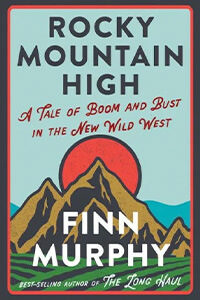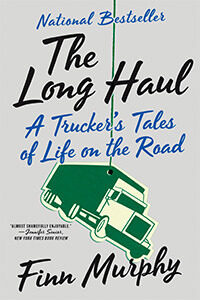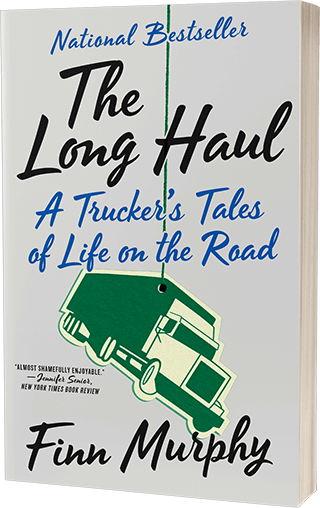The Long Haul
A Trucker's Tales of Life on the Road
Brimming with personality and great characters, The Long Haul is a resonant portrait of the enduring appeal of manual labor.
More than thirty years ago, Finn Murphy dropped out of college to become a long-haul trucker. Since then he’s covered more than a million miles packing, loading, and hauling people’s belongings all over America. Known by his trucker handle as U‑Turn, he spends his days (and many of his nights) in a 53-foot eighteen-wheeler he calls Cassidy.
In The Long Haul, Murphy offers a trucker’s‑eye view of America on the move. Going far beyond the myth of the American road trip, he whisks readers down the I‑95 Powerlane, across the Florida Everglades, in and out of the truck stops of the Midwest, and through the steep grades of the Rocky Mountains. As he crisscrosses the country, Murphy recounts with wit, candor, and charm the America he has seen change over the decades, from the hollowing-out of small towns to changing tastes in culture and home furnishings.
Some 40 million Americans move each year, and very few have any idea what they’re getting into or the kind of person to whom they are relinquishing their worldly goods. The Long Haul is also a behind-the-scenes look at the moving industry, revealing what really happens when we call in “the movers.”
Praise for The Long Haul
“There’s nothing semi about Finn Murphy’s trucking tales in The Long Haul.”
“The Long Haul delivers because it is a survey of a culture fused to a working man’s memoir — and Murphy, smartly, avoids sentiment and lazy comparisons: ‘I do not for a moment think I’m a symbol of some bygone ideal of Wild West American freedom of any other half-mythic, half-menacing nugget of folk nonsense.’ I predict, and hope, that The Long Haul marks the beginning of a new set of American road tales.”
— The Paris Review
A mood of mystery surrounds movers and truckers. Like priests, movers shepherd us through life’s transitions; like cowboys, truckers drive the roads we’ll never know. Both see America in ways the rest of us don’t. In ‘The Long Haul,’ Murphy, who specializes in long-distance moves and drives an eighteen-wheeler, promises to bring us into his semi-mythic world. And yet Murphy himself is the book’s real mystery…In crushingly hard work, Murphy seems to be escaping from himself.”
— The New Yorker
“What redeems this book, time and time again, are the stories Murphy tells. My goodness, how astonishing they are, and how moving, and how funny, and how just plain weird. Wait until you get to the one about the unlikely polygamist. Or the client who dies, mid-move. The next time you think of your movers as invisible, remember: They see all of your secrets. They know exactly who you are.”
— The New York Times
“Like a Mark Twain behind the wheel, he takes us on the road coast to coast and city to city with a voice that is honest and direct and sometimes even poetic.”
— The Boston Globe
“Murphy, a scholar of life after packing, loading and shuttling more than 3,000 homes from here to there, provides a rare, fascinating glimpse into the lives of big-rig pilots and the people they move..Considering the historical role truckers have played in American folklore, it’s surprising there aren’t any more road-weary nomads scribbling captivating stories from their cabs. In that vein, Murphy is a literary pioneer.”
— The Denver Post
“For what seems like forever, John McPhee and professional nonfiction writers like him have been the ones to explain things like trucking to us. For now, in a well-written story that rarely slows down, the driver can go it alone.”
— The Los Angeles Times
“There’s nothing semi about Finn Murphy’s trucking tales in The Long Haul.”
— Vanity Fair
“It’s a hoot to ride along with Murphy, who advises us four-wheelers to trust maps not auto GPS systems and, whenever passing a big rig, ‘pass it fast and get ahead of it.’”
— The Seattle Times
Order The Long Haul




